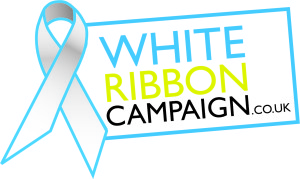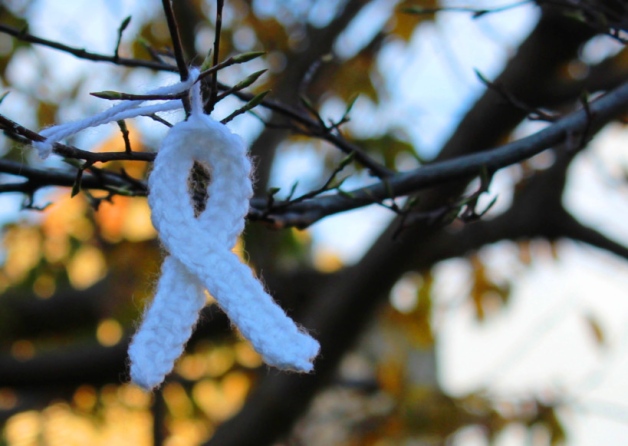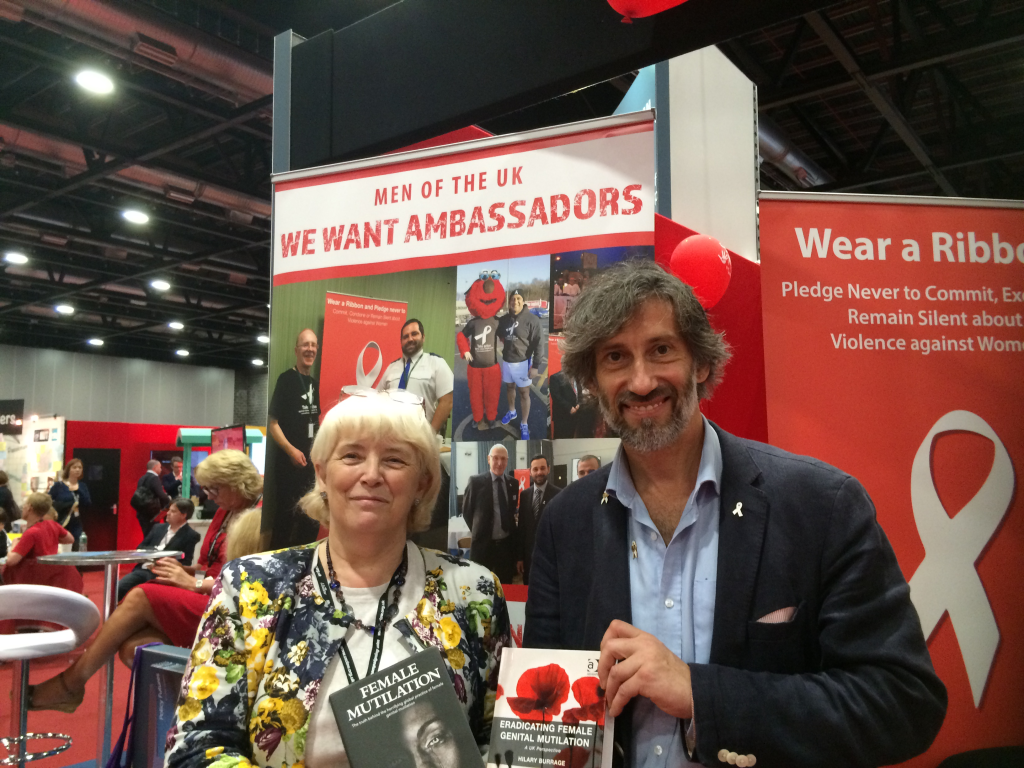The UK SAYS NO MORE team were fortunate to meet with David Bartlett, CEO of the White Ribbon Campaign here in the UK, to learn more about their movement to end violence against women and about how we can work on this together.
The White Ribbon Campaign have joined UK SAYS NO MORE as a partner and we’re so pleased to promote the work they are doing to engage men in ending violence against women, encouraging discussion and to pledge to not condone or ignore violence when they know it is happening.
Here David Bartlett shares a blog with us in the run up to the start of 16 Days of Activism, which launches on 25th November.
Reasons to be Cheerful?
25th November is the International Day for the Elimination of Violence against Women, and the start of 16 Days of Activism against Gender-Based Violence. This is a time to focus our energies on practical actions and awareness-raising to end violence against women and girls. 25th November is also international White Ribbon Day, when men and boys are specifically encouraged to take a stand against male violence against women and girls.
It’s a busy and inspiring time of year – a time for drawing closer together with allies, and reaching out to new communities and individuals.
But I wouldn’t say it makes me feel especially cheerful. Male violence against women and girls is no laughing matter. Nor is many men’s and boys’ response to it. The ONS estimates that a massive 1.4 million women suffered domestic violence in England and Wales in 2014. But, all too often, this appalling breach of the human rights of so many women and girls (mostly carried out by men) still fails to engage most (other) men’s attention and action.
Let’s be completely clear – this is not and never was a “women’s issue”. Just like any other aspect of gender equality, men have to be part of the solution, alongside women – part of creating a culture where male violence, abuse and harassment against women are simply seen as unacceptable.
The White Ribbon Campaign UK was set up 10 years ago to challenge men’s silence and inaction about gender violence and gender inequality. There’s still a long, long way to go. We live in a world where the richest nation in the world has just elected a male President who is shockingly disdainful of women’s rights not to be sexually assaulted. A world where 1 in 5 young men believe that women often ’provoke violence’ (“Young People’s Attitudes Towards Gendered Violence”; Burman and Cartmel, 2005), and over a quarter of people surveyed think a woman is partially or totally responsible for being raped if she wears sexy or revealing clothing (“Sexual Assault Research”; Amnesty. 2005).
was set up 10 years ago to challenge men’s silence and inaction about gender violence and gender inequality. There’s still a long, long way to go. We live in a world where the richest nation in the world has just elected a male President who is shockingly disdainful of women’s rights not to be sexually assaulted. A world where 1 in 5 young men believe that women often ’provoke violence’ (“Young People’s Attitudes Towards Gendered Violence”; Burman and Cartmel, 2005), and over a quarter of people surveyed think a woman is partially or totally responsible for being raped if she wears sexy or revealing clothing (“Sexual Assault Research”; Amnesty. 2005).
This isn’t about collective male guilt for the violence of a minority of individual men. But it is about challenging the sense of dominance and superiority over women that most men are socialised into from our early years. As Owen Jones puts it, “We did not invent it, but we did inherit it”. This sense of entitlement is part of the problem, because it tends to legitimise male violence.
It is also about opening up more fluid, open ways of being a man, in which men do not feel they have to prove their manhood by being aggressive, successful alpha males – where they can show their vulnerability, and fulfil their potential free from a rigid definition of masculinity.
The good news is that there is nothing inevitable about any of this. We don’t have to fulfil those old stereotypes. What it means to be a man is already changing, and the future of masculine identity is up for grabs. Fundamentally, White Ribbon believes in men – in their ability and willingness to be part of the solution.
Another reason to be cheerful – most men, when asked, are completely opposed to violence against women. And men have much to gain from gender equality and healthier relationships between men and women. Restrictive gender roles harm men as well as women, boys as well as girls.
There are already many men who want to play their part – and more and more are doing just that. They are calling out abusive and sexist behaviour where they witness it – in the workplace, in the street, and online. They are listening to and supporting women, and encouraging other men and boys to step up. They are treating women in their personal lives respectfully, and sharing the double shift of childcare and housework.
It’s easy to preach to the converted. Developing a much broader campaign will be more difficult. Many young men feel that men get a bad press – they already feel judged, and focussing on male violence could easily be a turn-off. But we are not anti-male – this is all about creating space for more positive, healthy ways of being a man.
So White Ribbon needs more men to help us spread the word, to reach out to men and boys where they are. We need Campaign Ambassadors who can be good role models, help other men and boys understand just how big this problem is, and what they can do to stop male violence against women and girls and promote healthy relationships. And we need to work in partnership with many different organisations to help us reach out across our whole society. To find out more, read our new Ambassadors leaflet, or email us at [email protected].
Developing new ways of men and women working in partnership for gender equality will be challenging – but ultimately there is no other way. This is not something men should be doing in isolation from women. Men should take responsibility alongside, and in dialogue with, women.
Join us. On 25th November. For the 16 Days of Activism. And every day until we live in a world safe for all. Because we are stronger together.
Thank you to David for contributing this blog – David Bartlett is the CEO of the White Ribbon Campaign.
Visit whiteribboncampaign.co.uk for more information!
Interested in becoming a partner of UK SAYS NO MORE?
We’d love to hear from you, please get in touch with Lyndsey Dearlove, Violence Against Women and Girls (VAWG) Partnership Manager.
You can contact Lyndsey by email at [email protected] or by phone at 020 7378 3170.
[maxbutton id=”11″]






